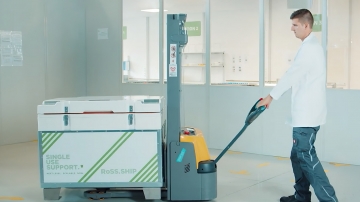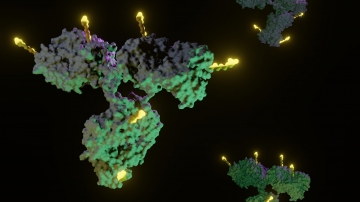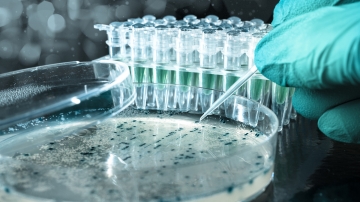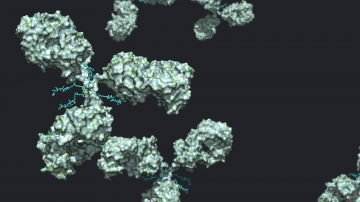Controlled freezing of ADCs
Table of contents
ShowADCs (Antibody Drug Conjugates) are an incredibly promising treatment for cancer or autoimmune diseases - but they come with challenges in manufacturing and safe handling.
Controlled freezing is an increasingly important topic in ADC production. Controlled freezing with plate-freezing technology enables the precise control of temperature decreases, ensuring a consistently high freezing velocity that leads to a significantly lower level of cryoconcentration and protein denaturation. Moreover, this technology can enable better preservation of the original characteristics of the substance being frozen, thus providing advantages such as enhanced process reproducibility and scalability.
In this article, we will delve deeper into controlled freezing of ADCs, and how plate-freezing technology is optimizing ADC manufacturing.
What are ADCs?
Antibody-drug conjugates (ADCs) are an exciting new class of drugs that could revolutionize the treatment of cancer and other diseases. ADCs can deliver highly potent chemicals to selectively destroy harmful cells in the body, leaving healthy cells untouched.
ADCs comprise an antibody that is joined by a chemical linker to a biologically active drug or a cytotoxic compound via bioconjugation.[1] The monoclonal antibodies (mAbs) that make up the antibody component of ADCs can be carefully designed to target specific cells, such as tumor cells. These mAbs possess some cytotoxic activity themselves, but their cytotoxic activity is not sufficiently powerful to destroy an entire tumor. This is where the linked cytotoxic compounds play a role. These compounds are much more cytotoxic than mAbs. However, because the cytotoxic activity of these compounds is so powerful, they are not safe to be systemically delivered to a patient. Being linked to a specifically targeted mAb enables these dangerous substances to only be delivered to a patient’s tumor cells, avoiding damage to other cells in their body.[1]

Disadvantages of ADCs
ADCs do have some disadvantages, however, such as their large molecular size and issues with their ability to enter cells; small molecule-drug conjugates (SMDCs) offer one means of avoiding these drawbacks.[2] These biomarker-targeted small molecule compounds have a lower molecular size than antibodies, which enables them to more easily penetrate solid tumors. In the case of one recently developed SMDC, it targets tumor cells and then releases its cytotoxic payload, which subsequently enters tumor cells and destroys them by causing damage to their DNA.[2]
Immune-stimulating antibody conjugates (ISACs) are another subset of ADCs. One of the challenges faced by the human body when it comes to fighting tumors is that the normal function of immune cells within a tumor is suppressed. This prevents the immune system from recognizing the tumor cells as a danger that should be destroyed. The immune system has a group of cells known as antigen-presenting cells. These cells display antigens from potentially harmful invaders, including pathogens and cancer cells. The displayed antigens act as a signal to the immune system, telling it which cells to target for destruction. Within the tumor microenvironment, however, these antigen-presenting cells are repressed. The active component of an ISAC is an immunostimulatory agent. This immunostimulatory agent causes repressed antigen-presenting cells to resume their role presenting antigens, which sends a signal to other immune cells, known as T cells, that subsequently begin to attack the tumor.[3]
Freezing ADCs
There are some important factors to consider in the development, production, transport, and storage of ADCs. Proteins, including antibodies, must be stored carefully to prevent their decomposition. However, if ADCs undergo repeated freeze-thaw cycles they are susceptible to aggregation, which can affect their efficacy, so they are often stored at 2–8°C.[4] To enable longer-term storage, ADCs are generally subjected to freeze-drying, which is also known as lyophilization. Most of the currently marketed ADCs are lyophilized products. However, the rate of freezing is difficult to control when using the conventional, static freezers employed for lyophilization. Uncontrolled freezing can also cause proteins to aggregate, leading to their denaturation.
Controlled freezing, therefore, is an increasingly important topic in ADC production. Plate-based freezer technology allows the precise control of temperature decreases, with setpoints that can be introduced according to a product’s characteristics, allowing faster or slower freezing, as required. With plate-freezers, such as Single Use Support’s RoSS.pFTU system, protein degradation is prevented from occurring during the freezing process by ensuring controlled, rapid, and uniform freezing. A consistently high freezing velocity leads to a significantly lower level of cryoconcentration (the concentration of proteins in the solid or liquid parts of a partially frozen mixture), denaturation, and formation of aggregates.[5] It also enables better preservation of the original characteristics of the substance being frozen. RoSS.pFTU is a controlled hybrid freezer which can be used for both in one platform, to freeze and thaw single-use bags with plates and bottles with blast freezing technology.
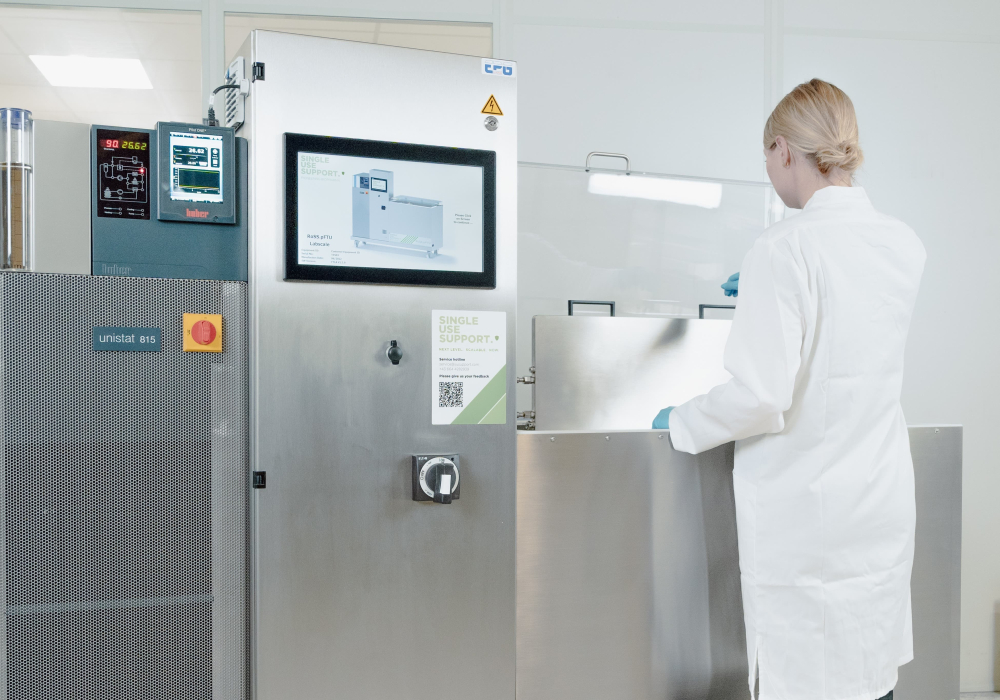
There is a growing recognition of the need to maintain uniform or at least similar conditions for freezing, frozen storage, and thawing of drug substance and sensitive products such as ADCs. There is also a requirement for enhanced process reproducibility that is both scalable and of high quality. It is essential that standardized current Good Manufacturing Practice (cGMP) cold-chain process steps are established for manufacturing ADCs. Plate-freezing technology affords ADC manufacturers all of these important features.
Safety challenges associated with ADCs
Due to the cytotoxic nature of the drugs used to form the active component of ADCs, they represent a potentially serious hazard to staff involved in ADC production. This creates additional challenges for process safety in the development and manufacture of ADCs. Unconjugated cytotoxins used in ADC manufacturing, for example, require a containment strategy that prevents employees who are working with these potent cytotoxins from inhaling them or having them come into contact with their skin; a further containment strategy must be in place that ensures personnel outside the main manufacturing suite area are not exposed to any cytotoxins.[6]
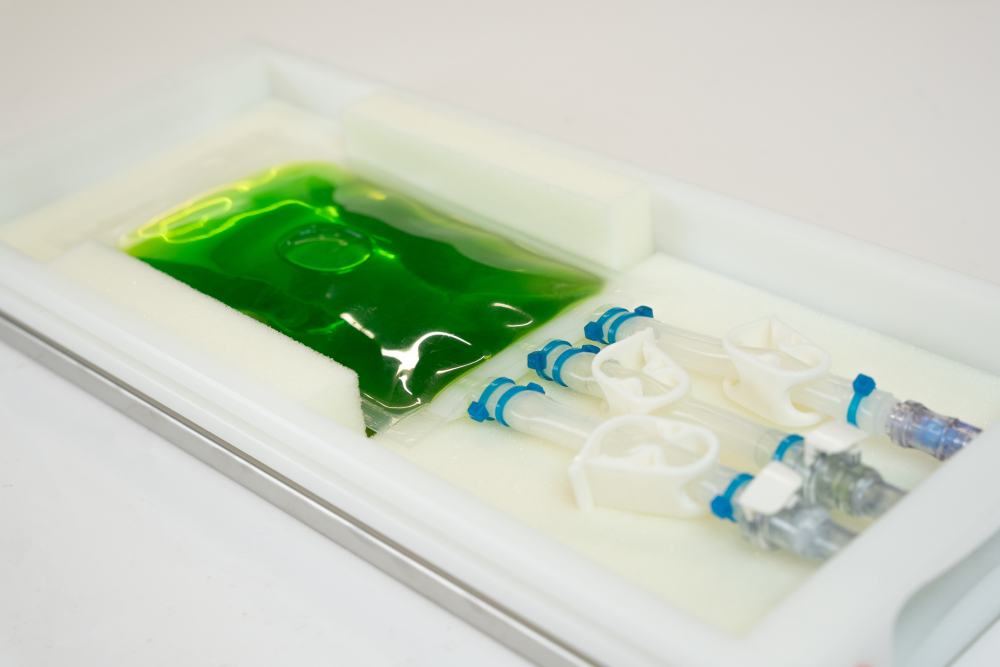
Fluid management during the production of ADCs is crucial, therefore, to ensure the safety of all staff. Any breakage of sample containers holding ADCs or their cytotoxic components could pose a serious threat to staff safety. Careful handling and reliable protection are required throughout the entire production and logistics process. Single Use Support’s RoSS® shell (a robust shell system for frozen storage and shipping), comprising an outer sleeve of robust stainless-steel and an adaptive inner layer of 3D foam, forms a closed system around single-use systems and can contribute to the safe transport and storage of high-value and potentially harmful substances.[7] Cold chain shipping at uniform temperatures below -60°C for at least 6 consecutive days can be performed with RoSS.SHIP. RoSS.FILL is an automated aseptic filling platform to dispense ADCs into single-use bags at highest speed and accuracy. Automated processes replace human intervention in this process with potentially hazard to staff optimizing. Therefore it reduces not only the risks for process safety, but also for human error in operation.
Summary - Freezing & Thawing ADCs
ADCs and related novel drugs, such as SMDCs and ISACs, represent a highly promising development in the search for new and improved ways to treat cancer. However, the final quality of biopharmaceuticals such as ADCs is highly dependent on the process step of freezing and thawing and requires rapid freezing, a reliable cold-chain, and effective process management throughout their storage and shipment. To fully rise to the challenge of manufacturing these products at scale, and with the safety of staff involved at every step of the manufacturing chain being paramount, Single Use Support stands ready to provide solutions to all involved.
1. ADC Review. What are Antibody-drug Conjugates? 2019 26 September 2022]; Available from: https://www.adcreview.com/the-review/antibody-drug-conjugates/what-are-antibody-drug-conjugates/.
2. Lerchen, H.G., et al., A Small Molecule-Drug Conjugate (SMDC) Consisting of a Modified Camptothecin Payload Linked to an α(V)ß(3) Binder for the Treatment of Multiple Cancer Types. Cancers (Basel), 2022. 14(2).
3. Ackerman, S.E., et al., Immune-stimulating antibody conjugates elicit robust myeloid activation and durable antitumor immunity. Nature cancer, 2021. 2 1: p. 18-33.
4. Källsten, M., et al., Investigating the Impact of Sample Preparation on Mass Spectrometry-Based Drug-To-Antibody Ratio Determination for Cysteine- and Lysine-Linked Antibody-Drug Conjugates. Antibodies (Basel), 2020. 9(3).
5. Single Use Support. Thawing antibodies - Freeze Thaw technology for handling mAbs on a higher quality level. 2020 27 September 2022]; Available from: https://www.susupport.com/company/news/freeze-thaw/thawing-freezing-antibody-technology-handling-mabs.
6. Rohrer, T. Consideration for the safe and effective manufacturing of antibody-drug conjugates. 2013 27 September 2022]; Available from: https://www.adcreview.com/articles/consideration-safe-effective-manufacturing-antibody-drug-conjugates/.
7. Single Use Support. Frozen storage and shipping in biopharma with RoSS. 2021 27 September 2022]; Available from: https://www.susupport.com/company/news/freeze-thaw/frozen-storage-shipping-biopharma.





